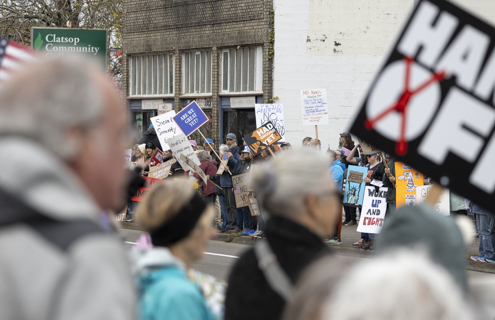FACT CHECK: Claire McCaskill, Josh Hawley argue over immigration, taxes in final Senate debate
Published 5:00 pm Wednesday, October 24, 2018
KANSAS CITY The last U.S. Senate debate between Sen. Claire McCaskill, D-Mo., and Republican Attorney General Josh Hawley began with a question about civility in the campaign. Hawley said hed never attacked McCaskill personally. The senator objected.
And so it went.
The two candidates spent most of the hourlong debate at KMBC television station battling over their public service records and their views on immigration, gun control, gay rights, health care and the economy, among other topics.
Whats personal is in the eye of the beholder, but facts are not. We looked into many of their statements during the debate, some of which were new, some of which theyd said previously, in an attempt to offer a full and honest picture.
McCaskill: Says Hawley said four-year degrees are worthless at one point.
Hawleys stump speech typically includes the word worthless to characterize four-year colleges.
I never said that degrees were worthless. I said that four-year colleges increasingly turn out degrees that can be worthless, Hawley said when McCaskill quoted him.
Hawley has been quoted calling four-year degrees increasingly worthless many times, including in The Kansas City Star on Sept. 2, the Columbia Daily Tribune on May 10 and on KTRS The McGraw Show on May 29.
During Thursdays debate, Hawley proposed an alternative to the four-year system, which both candidates agreed incurs too much debt. I think we ought to allow federal student loan dollars to follow people into apprenticeships and job training programs, Hawley said. I dont think you have to have an expensive four-year degree to get a good job, or to get some respect in this country.
Theo DeRosa
Hawley: Senator (McCaskill), you called the middle-class tax cuts scraps. Missouri families are saving 1,200 more dollars, average Missouri families.
She did use the word, in the context of saying Missourians deserved more. In a statement she released after voting against the 2017 Tax Cuts and Jobs Act, she said, working people in Missouri deserve better than to get scraps, while corporations and wealthy business owners make out like bandits.
The Hawley campaign did not respond to our inquiry about the source of the $1,200 savings. PolitiFact rated a similar statement from House Speaker Paul Ryan about the average familys savings as Half True. Ryans estimate was based on a plausible calculation but glossed over some context. It didnt factor in several itemized deductions that would disappear and that could have a significant impact on at least some typical families. Finally, the savings would only come in the first year, and then the benefits start to shrink before turning into a tax hike.
In evaluating Hawleys claim, John Buhl of the Tax Foundation pointed us to a state-by-state breakdown of estimated after-tax income changes due to the tax plan for a middle-income family. For Missouri, that estimated increase was $605.
Buhl also pointed us to a report along the same lines from the conservative Heritage Foundation that shows the average savings for 2018 for all Missouri filers at $1,014.
Theo DeRosa
McCaskill: Zero felonies in Missouri have been filed from search warrants looking for human trafficking evidence in Springfield massage businesses.
McCaskill portrayed Hawleys tenure as attorney general as ineffective, spotlighting a July 2017 multistate human trafficking investigation. We could not find any felony charges filed from his office through a search of online court records.
Hawleys team executed search warrants that July of 13 massage businesses in Springfield, looking for evidence of human trafficking.
A day after the search, nine people were charged with a misdemeanor for not having the proper license to operate a massage business, according to online court records. These seem to be the only criminal charges filed from Greene County.
The Springfield News-Leader, about a year later, reported that there still havent been any felonies charged as of Feb. 18. Hawleys office told the News-Leader then that there would be further action in days to come.
But a search through online court records in the later weeks revealed nothing. Neither Hawleys office nor his campaign responded to a request for comment by deadline.
In Louisiana, the state attorney general filed human trafficking charges against Bingbing Li and Linan Tian, who also owned Palm Spa in Springfield.
Titus Wu
Hawley: Says McCaskill voted to raise taxes or fees 200 times in her 12-year career in the United States Senate.
The figure Hawley cites double counts votes and includes votes against tax cuts, which is not the same as raising taxes.
The website ClaireMctaxall.com, paid for by Hawleys campaign, contains a list of supposed instances where McCaskill voted to increase taxes. When we reached out to them for comment they only replied with a link to this website.
The website includes 19 votes for tax increases we could identify. Here are some examples:
The Consumer First Energy Act of 2008 that impose[d] a windfall profits tax on major integrated oil companies.
The FAA Air Transportation Modernization and Safety Improvement Act that excise[d] taxes on aviation fuels and air transportation of persons and property to raise revenue for the Airport and Airway Trust Fund.
The Middle Class Tax Cuts Act that taxed individuals 3.25% of so much of their modified adjusted gross income as exceeds $1 million.
Its important to note that most taxes cited were on things like corporations, oil companies and airlines, as opposed to the typical American.
The list includes many instances where McCaskill voted against tax cuts, voted against renewing a tax, or voted to make it more difficult to repeal taxes. None of these are the same as raising taxes; they would instead maintain or decrease the amount of taxes.
The other issue with this list is that several bills are counted twice, because that legislation required multiple votes and revisions to reach a majority. Of the 19 votes McCaskill cast to raise taxes on this list, six were repeated measures.
Dylan Sherman and Hannah Archambault
McCaskill: The Republicans had it backwards. They made the rich peoples tax cuts permanent. They made the middle-class tax cuts temporary. Id like to flip those.
To get around Senate rules and pass the tax cut in 2017, Republicans had to set several of the tax bills provisions to expires.
An analysis by the nonpartisan think tank Tax Policy Center, released shortly before the Tax Cuts and Jobs Act passed in December, found that the bill would reduce taxes on average for all income groups.
However, the center also found that higher income households receive larger average tax cuts as a percentage of after-tax income, with the largest cuts as a share of income going to taxpayers in the 95th to 99th percentiles of the income distribution.
The Tax Foundations analysis also found that the majority of individual income tax changes would be temporary, expiring on December 31, 2025. Some of the changes that will remain permanent, as reported previously by PolitiFact, are the reduction of the corporate tax rate, the lower pass-through business income tax rate and the repeal of the estate tax. Those tax changes typically affect higher earners.
Morgan Keith
Hawley: McCaskill has repeatedly voted against border security funding, she has voted for amnesty for illegal aliens, and she is currently sponsoring the most radical open border bill ever introduced in the United States Congress. Hawley also said McCaskill called President Trumps border wall embarrassing.
Voted against border security funding: Sometimes. In 2010, McCaskill and Sen. Chuck Schumer fought for $600 million in supplemental money for 1,500 new border personnel, a pair of unmanned drones and military-style bases along the border, according to Politico. McCaskill voted for 700 more miles of fencing to be built along the Mexican-American border in 2009, thereby increasing funding. And in 2018, McCaskill was a proponent of a plan that sought to allocate $25 billion for a border wall. But she voted no on a similar bill supported by Trump soon after.
Voted for amnesty for illegal aliens: This is not the whole truth. In 2013, McCaskill voted yes on a bill that would have provided immigrants who lived in the country without documentation a path to citizenship. But the bill, which included border security dollars, involved a $500 fine and an application for six-year provisional status. Permanent legal status could only be achieved after 10 years, a $1,000 fine and learning English.
Supporting radical open borders bill: We rated this False in an earlier fact-check. The Keep Families Together Act does not reduce border protection, nor does it offer special protection to immigrants who cross the border without documentation.
She called Trumps border wall embarrassing: At a Senate Homeland Security and Governmental Affairs Committee meeting last year, McCaskill said: The sooner we stop this, were going to build a wall from sea to shining sea and the Mexicans are going to pay for it its embarrassing, McCaskill said. Its not going to happen. Everybody in Congress knows its not going to happen.
Sten Spinella
Hawley: We have a national background check system that currently has a huge loophole, it does not include mental health records … Sen. McCaskill has voted against that.
This talking point is misleading. Hawley was referencing McCaskills vote against a 2016 amendment (SA 4751) to the Commerce, Justice, Science, and Related Agencies Appropriations Act. The amendment, sponsored by Sen. Chuck Grassley, R-Iowa, would have incentivized states to submit relevant mental health records to the National Instant Criminal Background Check System.
McCaskill joined a majority of Democrats against the measure, which failed to get the 60 votes needed to pass.
That vote doesnt tell the full story of McCaskills actions on legislation involving background checks for gun purchases.
McCaskill did vote for another amendment to the appropriations act (SA 4750) co-sponsored by Sen. Chris Murphy, D-Conn., known as the Fix Gun Checks Act of 2016. Its purpose was to ensure all individuals who should be prohibited from buying a firearm are listed in the national instant criminal background check system and require a background check for every firearm sale, and it gave specific provisions for defining mental health records. The Murphy amendment did not pass, either.
Over 12 years in the Senate, McCaskill has also favored other legislation aimed at strengthening the background check system and the inclusion of mental health records, including votes for the 2007 NICS Improvement Act and the failed Manchin-Toomey amendment of 2013 and co-sponsorship of the 2017 Fix NICS Act.
Kathryn B. Palmer
McCaskill said that the Border Patrol agents have endorsed me in this race.
Theres a slight difference: The Border Patrol agents union has indeed endorsed McCaskill. As the National Border Patrol Council, a union representing around 18,000 border patrol agents, wrote in a September 2018 op-ed: In 2018, we endorsed Donald Trump for president because he was tough on borders and strong on enforcement. Were endorsing Claire McCaskill now for the exact same reasons.
Hawley: We dont have to have the 159 new agencies under Obamacare. You dont have to have the 20 new federal taxes for it.
These talking points are old and misleading. Hawleys campaign did not respond to a request for evidence.
Hawley is correct that Obamacare resulted in the creation of dozens of new entities to implement the legislation, according to a Congressional Research Service report from 2010 looking at just that.
But the same report explicitly debunks an article which lists 159 new boards and commissions created under the new health care law. Many of the listed boards and commissions are actually grants, demonstration or pilot projects, and programs, CRS said.
As for the 20 taxes, PolitiFact investigated a similar claim about in 2012. We found then that characterizing these price hikes as taxes is misleading. Some are fees on health insurance providers proportionate to their share of the market, as well as fees for importers and manufacturers of branded drugs.
But others are mandates or penalties, such as penalty for companies with more than 50 employees who do not offer adequate health insurance.
Andrew Withers
McCaskill: I know the tax cut has not produced what they promised. It hasnt paid for itself. Our deficit is up, our revenues are down in a strong economic climate.
McCaskills statement holds some truth. Since the passage of the Tax Cuts and Jobs Act, the nominal dollars, or the actual amount of money spent in a period of time, have increased by less than half a percent, one of the weakest increases since World War II. When factoring in inflation, tax revenue actually decreased by 1.6 percent
Matthew Hall





